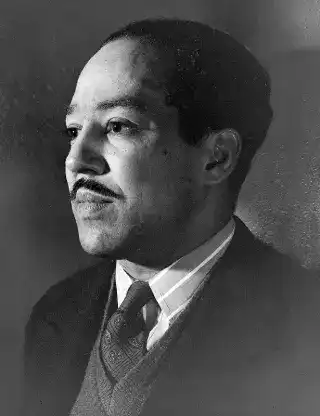Biography of Langston Hughes

| date | place | |
|---|---|---|
| born | February 01, 1901 | Joplin, Missouri |
| died | May 22, 1967 | New York City, U.S. |
James Mercer Langston Hughes, born on February 1, 1901, in Joplin, Missouri, left an indelible mark on American literature and culture. As a leading figure of the Harlem Renaissance, Hughes was instrumental in reshaping the landscape of African American artistic expression in the 20th century. His multifaceted talents spanned poetry, social activism, fiction, drama, and journalism, earning him widespread acclaim and enduring influence. Growing up in the racially charged atmosphere of early 20th-century America, Hughes experienced firsthand the struggles and triumphs of the African American community. Raised primarily by his maternal grandmother, Mary Patterson Langston, in various Midwestern towns, Hughes developed a deep sense of racial pride and empathy for the marginalized. This formative upbringing, steeped in the oral traditions and activist ethos of his grandmother's generation, laid the foundation for his lifelong commitment to championing the voices of black Americans. Hughes's literary journey began at an early age, marked by a prolific output of poems, short stories, and plays. Despite facing racial prejudice and discrimination, he pursued his education, attending high school in Cleveland, Ohio, and briefly studying at Columbia University in New York City. It was in the vibrant cultural milieu of Harlem where Hughes found his creative home, immersing himself in the artistic ferment of the Harlem Renaissance. A seminal figure in the development of jazz poetry, Hughes fused the rhythms and cadences of jazz music with the lyricism of poetry, pioneering a distinctive literary form that captured the essence of African American experience. His seminal poem "The Negro Speaks of Rivers" exemplifies this fusion, evoking the timeless flow of history and culture through vivid imagery and musical language. Hughes's literary contributions extended beyond poetry, encompassing novels, essays, plays, and children's literature. His novel "Not Without Laughter," awarded the Harmon Gold Medal for Literature in 1930, offers a poignant portrait of African American life in the Midwest, exploring themes of family, identity, and social inequality. In his short story collection "The Ways of White Folks," Hughes delves into the complexities of race relations with biting wit and incisive observation. Throughout his career, Hughes remained deeply engaged with the social and political issues of his time, using his platform to advocate for racial justice and equality. From his early involvement with the Communist Party to his outspoken support for the Spanish Civil War and civil rights movement, Hughes was unafraid to confront injustice and challenge the status quo. Despite facing criticism and scrutiny, Hughes's commitment to his principles never wavered. His unwavering belief in the power of literature to effect social change and foster understanding resonated with generations of readers and writers alike. Today, his legacy endures as a testament to the enduring power of art to illuminate the human experience and inspire hope in the face of adversity. Through his timeless words and indomitable spirit, Langston Hughes continues to inspire and uplift countless souls, transcending boundaries of race, culture, and time. Langston Hughes, a luminary of the Harlem Renaissance, crafted a poetic legacy that continues to captivate audiences worldwide. The poems of Langston Hughes resonate with profound insights into the African American experience, offering a poignant reflection of the joys, sorrows, and aspirations of a marginalized community. Through his rich imagery and soul-stirring verse, Hughes paints a vivid portrait of life in early 20th-century America, highlighting themes of racial identity, social justice, and the pursuit of freedom. The enduring popularity of the poems of Langston Hughes is a testament to his unparalleled ability to distill the complexities of human emotion into exquisite verse. With a unique blend of lyrical language and rhythmic cadence, Hughes's poetry transcends cultural boundaries, speaking to the universal longing for belonging and dignity. Whether exploring the rhythms of jazz and blues or delving into the struggles of everyday life, Langston Hughes's poems continue to inspire and uplift, leaving an indelible mark on the literary landscape for generations to come.
Feel free to be first to leave comment.